Firewood Processors: A Complete Guide for Startups, Homesteaders, and Commercial Firewood Operations

Firewood processors are the backbone of modern firewood production. Whether you are a homesteader splitting for personal use, a startup entering the firewood business, or a commercial operator producing full cords at scale, the right processor can dramatically increase output, shorten cycle time, and reduce manual labor.
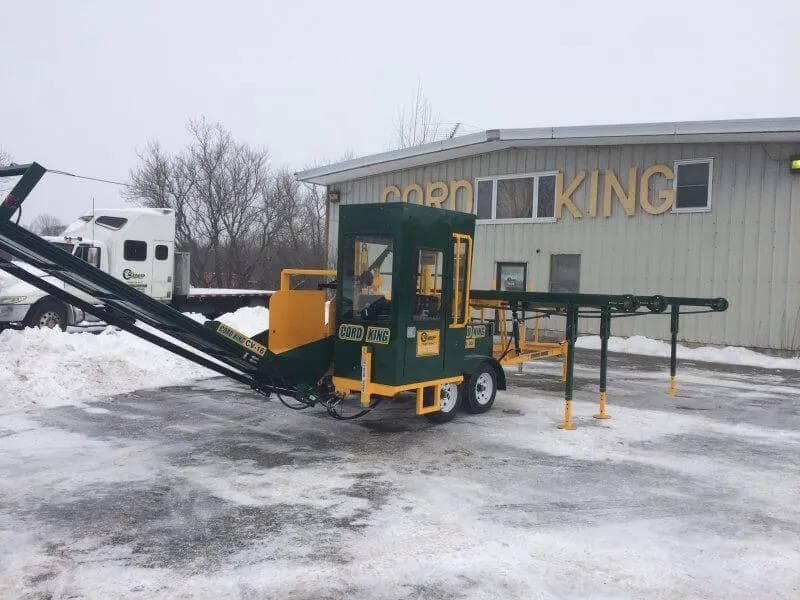
Firewood processing used to rely on chainsaws, wood splitters, and a lot of backbreaking work. Today’s processors combine cutting, splitting, and loading into one continuous system. With options like live decks, integrated conveyors, wedge options, and hydraulic log handling, a single machine can replace multiple individual tools and produce consistent, sellable firewood far faster and safer than manual methods.
Machinery Partner carries a growing lineup of heavy-duty firewood processors designed for commercial and homestead use. These machines are engineered to reduce cycle time, increase production volume, and handle logs of various diameters and lengths with ease.
What a Firewood Processor Does
A firewood processor takes raw logs and converts them into split, stove-ready firewood in a single workflow. Instead of handling logs multiple times, operators can process material from full trees or cut-to-length logs directly into bundled or loose firewood.
A typical firewood processor performs four core functions:
- Cutting the log to the desired length using a circular saw or bar saw
- Splitting the cut round through a hydraulic wedge
- Conveying the finished wood into a pile, trailer, or bundler
- Handling logs with live decks, grapples, or feed tables to reduce operator labor
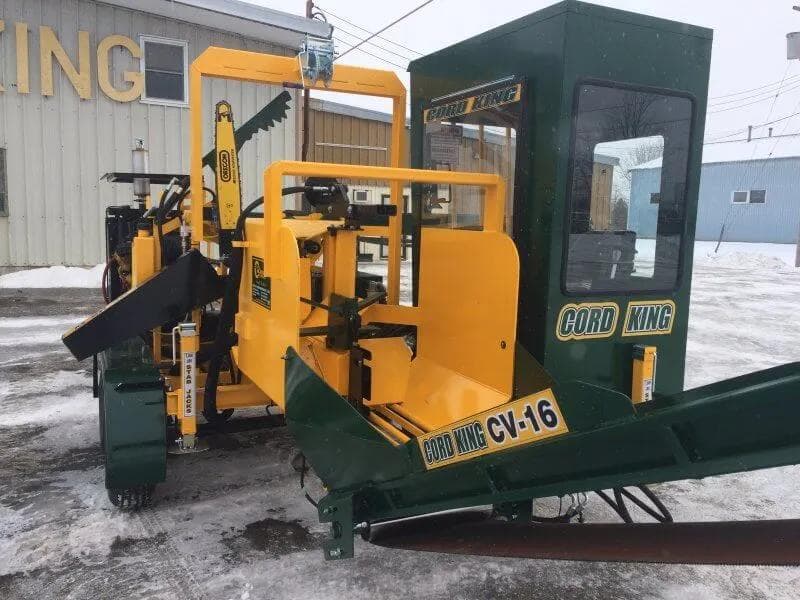
Production capacity varies from small mobile processors for homesteaders to commercial firewood processors capable of multiple full cords per hour. Integrated conveyors and hydraulic log handling systems reduce downtime and ensure smooth material flow throughout the process.
Types of Firewood Processors
Different operations need different levels of throughput, log diameter capacity, and mobility. Understanding the main types helps you choose the right solution.
Entry-Level / Homestead Firewood Processors
These compact processors are ideal for homeowners, small farms, and part-time firewood sellers. They typically run on gasoline engines, often using Kohler or Honda power, and handle smaller log diameters. They replace standalone chainsaws and wood splitters by combining both functions into one machine.
Mid-Range Commercial Processors
These machines increase production with faster cycle times, larger wedges, and more robust hydraulic systems. Businesses that sell loose firewood, supply campgrounds, or sell bundled firewood often choose this level. Mid-range processors typically offer adjustable log length settings, integrated conveyors, and heavier-duty components.
High-Production, Heavy-Duty Processors
For full-scale firewood businesses producing cords daily, heavy-duty commercial processors with diesel engines, advanced hydraulics, faster circular saw systems, and high-capacity live decks deliver the best value. These systems can process large volumes of logs with minimal downtime.
PTO-Driven Processors
Some processors can be powered by tractors or excavators using PTO or auxiliary hydraulics. These are ideal for farms or sawmill operations that want to leverage existing equipment and reduce engine maintenance costs.
Key Features and Components
Each feature of a firewood processor influences speed, output, and operator safety.
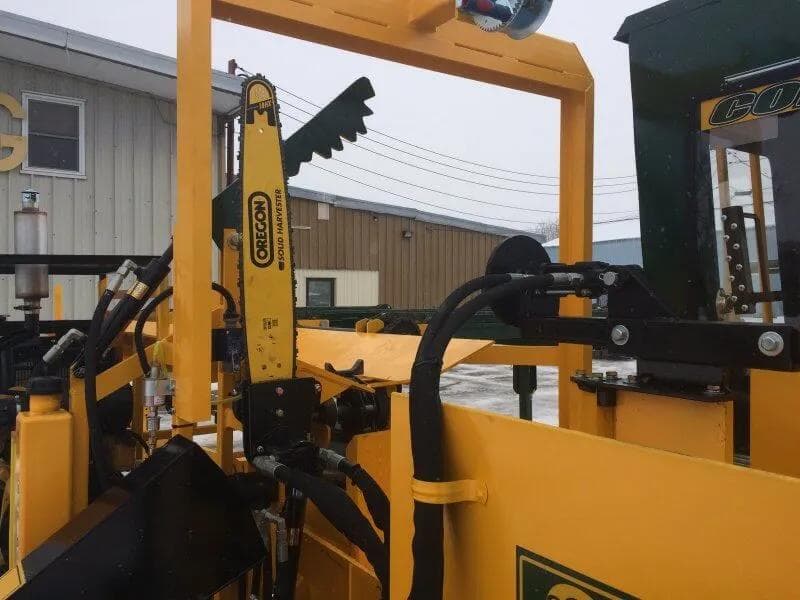
Circular Saw or Chainsaw Motor
Firewood processors typically use either a hydraulically driven chainsaw bar or a circular saw blade to cut logs. Circular saw systems offer faster cycle times and longer blade life, while bar saws are more affordable and easier to maintain.
Hydraulic Log Handling
Live decks, log clamps, and feed rollers move logs into cutting position. This reduces manual lifting and speeds up production. Larger processors often feature three or four-chain live decks capable of handling long logs and heavy pieces with ease.
Wedge Options
Most processors offer interchangeable wedges such as 4-way, 6-way, or 12-way split configurations. Higher wedge counts increase output but may require higher horsepower or larger hydraulic cylinders.
Integrated Conveyor
Integrated conveyors move split firewood directly into a truck, trailer, or firewood bundler. This reduces double-handling and maximizes operational efficiency.
Diesel, Gasoline, or PTO Power
Diesel engines are preferred for high-output commercial operations due to torque and durability. Gas-powered engines like Kohler are common on compact processors. PTO-driven systems pair well with tractors or excavators.
Log Diameter and Log Length Capacity
Larger processors handle logs well over 20 inches in diameter, while compact machines work best with smaller rounds. Adjustable log length settings allow operators to produce custom-sized firewood for retail or stove-specific markets.
Warranty and Build Quality
Because firewood processors undergo constant strain, heavy-duty frames, reinforced wedges, and reliable hydraulic systems are essential. Many premium processors offer solid warranties to support long-term business operations.
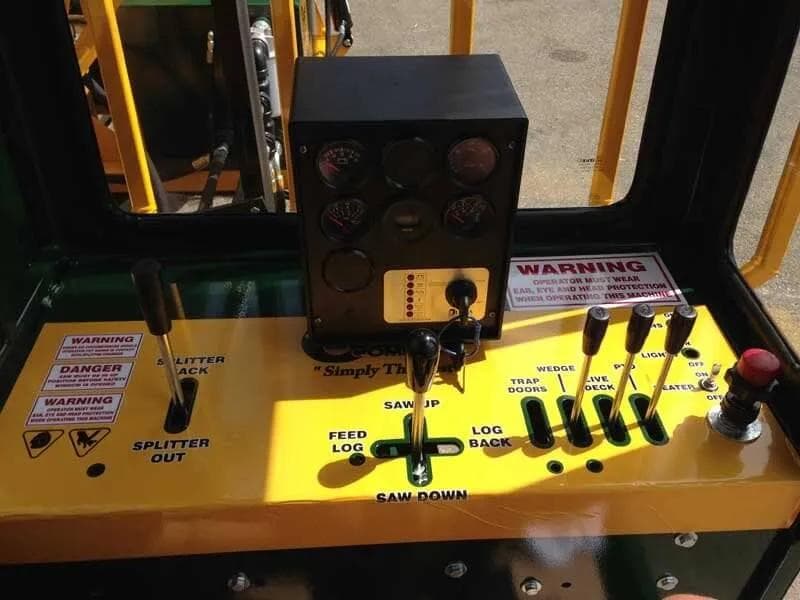
Who Uses Firewood Processors?
Firewood processors serve a wide range of users across different industries and property types.
Firewood Businesses and Start-Ups
New firewood businesses rely on processors to scale efficiently without hiring large crews. The ability to process full cords consistently and safely is essential for profitability.
Homesteaders and Farms
Rural properties producing their own firewood choose compact processors to reduce manual handling and increase safety.
Campgrounds, Resorts, and Parks
These operations often need bundled firewood, making processors with conveyors and bundlers a natural fit.
Sawmills and Timber Operations
Processors help repurpose scrap logs or offcuts into a sellable firewood product, adding revenue streams to sawmill operations.
Equipment Rental Companies
Firewood processors with simple controls and integrated conveyors are increasingly popular rental machines for seasonal work.
Benefits of Using a Firewood Processor
Firewood processors reshape the economics of firewood production by reducing labor and speeding up output.
- Faster cycle times from cut to split
- Less manual labor and reduced operator fatigue
- Ability to process consistent log lengths
- Heavy-duty construction supports high-volume operations
- Integrated conveyors eliminate double-handling
- Reliable hydraulics and power systems improve uptime
- Increased profitability for commercial operations
For many Machinery Partner customers, a fully configured processor with a live deck, wedge options, and integrated conveyor is the difference between part-time production and a scalable firewood business.
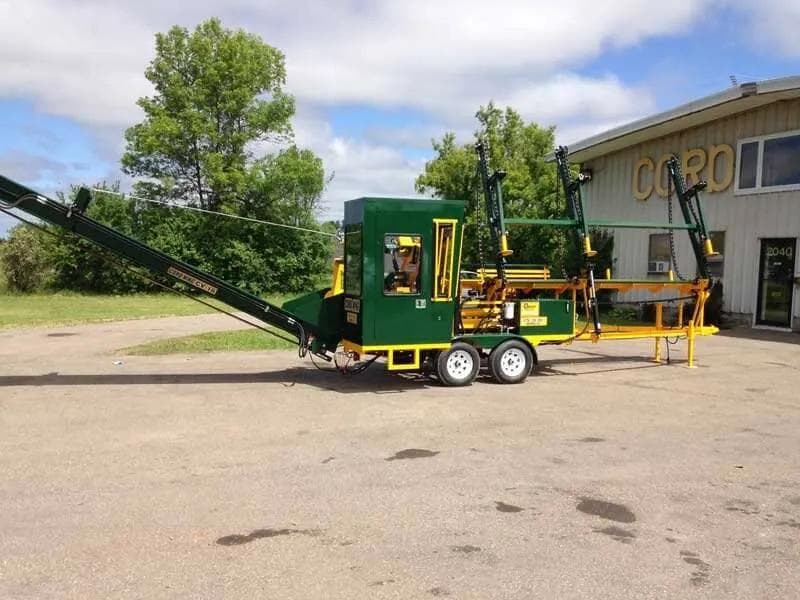
Machines Available from Machinery Partner
Visit Machinery Partner’s firewood processor category to explore available models:
https://www.machinerypartner.com/heavy-equipment-categories/firewood-processors
Our selection includes processors suitable for homesteaders, small firewood businesses, and commercial operations. Machines vary by horsepower, cycle time, log diameter capacity, wedge configurations, engine type, and conveyor length.
Frequently Asked Questions About Firewood Processors
What size firewood processor do I need for my business?
Choose based on log diameter, desired cord output per hour, and whether you need integrated conveyors or live decks. Commercial operations benefit from diesel-powered, heavy-duty models.
Are circular saw processors faster than chainsaw processors?
Yes. Circular saw processors typically offer shorter cycle times and lower long-term maintenance, particularly for high-volume operations.
Do I need a live deck?
Live decks reduce manual lifting and keep logs feeding continuously. They are recommended for daily or commercial firewood production.
Can firewood processors handle irregular or crooked logs?
Most processors can handle mildly irregular logs, but heavily twisted or knotted pieces may require a standalone log splitter or trimming before processing.
Can I run a firewood processor with a skid steer or excavator?
Some PTO or hydraulic models can run off a tractor, skid steer, or excavator. This is common in sawmills or timber operations with existing equipment.
How much does a commercial firewood processor cost?
Prices vary widely depending on capacity, engine type, and features. Entry-level units are more affordable, while high-capacity processors require larger investment but produce significantly more cords per hour.
What maintenance does a firewood processor need?
Regular bar or blade sharpening, hydraulic checks, engine service, wedge inspection, and conveyor belt adjustments.






